Written by Mutlu BİNİCİ
Translated by Ahmet Osman SOFU
Siyar-i Nabi is the holy whole life of our Prophet Muhammad (p.b.u.h.)* who knows his Rab* the best and introduces Him to people in the best way. It is the life history of our prophet (p.b.u.h.) who has the greatest morality that Allah disciplined, and who we love more than ourselves. And, we gain our Lord’s love by loving him.
Our prophet (p.b.u.h.) has indeed in the apostle of Allah a beautiful pattern of (conduct) for anyone whose hope is in Allah and the Final Day and who engages much in the praise of Allah. (Surah Al-Ahzab 33/21).He is not a hero of a story who lives behind the mythical mountain, he is one of us.
He was an orphan who could never see his father; a child who had to bury his mother in an isolated land of the desert and who shed tears in front of her grave and became an orphan at the age of 6. The holy orphan is visualized by people who are deprived of love of parents. 
He was a lonely shepherd who herded sheep in mountains in order to earn a living and a merchant who did not have any capital except honesty. There exist his patience and endurance in the hearts of courageous people who struggle with the challenges of life and earn their bread with difficulty.
He is the model of virtue that protects himself from badness and ugliness which exist in his society and struggles to become a pure person in a swamp. He is the shelter and helper of the mu’mins (believers) who defy against the spiritual corruptness of the times with their good morality and pass their youth in the way of Allah.
Our holy Lord who found our prophet an orphan and gave him shelter (and care) (Surah Al-Duha 93/6) made him meet the richest and the purest woman of the Quraysh tribe. Our dear Prophet who had not had the opportunity to marry and who had not considered marrying married to Hz. Hadijah, a woman whom everyone wanted to get married with but was refused.
Allah Teâlâ does not leave his servants who trust in Him solely and love Him, alone and helpless.
He was a faithful husband who shed tears after the death of his wife Hadijah and had remembered her with goodness until his death, a sorrowful father whose children died on his lap, and a grandfather whose face shone with light and who prolonged his sajdah (prostration) in order not to disturb his grandchildren who got on his shoulders in sajdah. He was a loving prophet who welcomed his daughters on foot, ran and embraced his grandchildren when he saw them in the door of the masjid (mosque) and behaved as a real father of the orphans of Madinah.
Our dear Prophet (p.b.u.h.) became very sad when his own sons died and showed great patience against the people who said that his generation would be extinct and he would be destined to be forgotten. He cried deeply when Zayd bin Harisa who he loved like his own son became a martyr. His daughters and grandchildren died in front of his very eyes. In the last days of his life, at the time his son Abraham was in his death throes, he looked at the mount of Uhud and expressed the pain in his heart by saying, “Oh the Mount of Uhud, you would not be able to bear the pain and suffering that I am going through now and you would be destroyed into pieces”. But, he never rebelled against his Lord and struggled to be stronger than the mount of Uhud.

As many years past, the ones who called our prophet (p.b.u.h) as “ebter”* were embedded in the time of history. The further generations and the rising sounds of the minarets always reminded people of the prophet (p.b.u.h.) who loves his Lord deeply and never let him be forgotten.
The people who lost their children, the loved ones and the belongings that hold them on to life always think of him and say like him: “To God we belong and to Him is our return”
He is the one who says, explains and interprets the message of Allah to His servants. He is the one who says, “I take hold of the knots at your waist (belts) to prevent you from falling into the fire, but you insist on falling into it” and who makes duas (prayers) for the people who broke his tooth and threw stones at him, tormented him and who sheds tears during the nights for them to be forgiven.
He is one of us; the one who feels sorry when we face distress, worries about us and shows his compassion and mercy. He is the one who never separates us from himself by saying “I’m like your father” , carries adobe on his shoulders and ties stone on his stomach due to hunger.
He is the one who has the great life that Allah has vowed upon and whom the divine words are shaped in flesh and bones. Loving him, adhering to him and being able to understand his cause is only possible by learning his exemplary life in-depth. Siyar-i Nabi is a holy science that enables us to receive the blessing of the Lord and the shafaat (intercession) of our dear prophet (p.b.u.h.). The generation that follows Ashab-i Kiram* learned our prophet’s (p.b.u.h.) and his friends’ lives like learning Qur’an, and they taught their children what they learned carefully because the ones who don’t know him and his struggle will be deprived of a lot of goodness.
On the day of his death, the Prophet (p.b.u.h.) got on foot and watched his ashab doing their salah (prayers). Their fulfillment of the prayers and the emphasis on the congregation filled his rosy face with a smile. This was the last scene that was left on the Muslims’ minds. The site of www.siyerinebi.com is prepared to be able to enhance this smile a little on his face.
(p.b.u.h.): Peace be upon him
Rab: an Arabic word for Lord
Ebter: the person whose generation is extinct
Ashab-i Kiram: the generation who saw the prophet
Bibliography
1. Ibn Sa’d, Tabakat , volume:1 page:139
2. Muslim, Fazail 19; Riqaq 26
3. Tirmidhi, Adab 82
4. Sunan Abi Dawud, volume:1 hadith no: 8
5. Muwatta, Qibla 1.
6. Ahmad bin Hanbal, II, 247, 250

Yeni yorum ekle